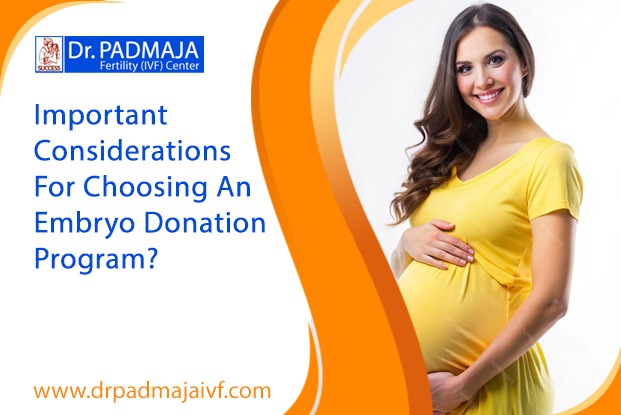Embryo donation can be a life-changing option for couples struggling with infertility. With the right program, you can find hope and the possibility of building your family. However, selecting the best embryo donation program involves several critical factors. Here, we outline essential considerations to help guide your decision.
Understanding Embryo Donation
Embryo donation is a process where embryos created through in vitro fertilization (IVF) are donated to couples who wish to conceive. This can be an ideal option for individuals facing various fertility issues, including women with a diminished ovarian reserve, single parents, or couples with genetic concerns. Programs like the best IVF center in Hyderabad can provide comprehensive support throughout this journey.
Reputation and Experience of the Clinic
When choosing an embryo donation program, it’s crucial to assess the reputation and experience of the clinic. Seek out initiatives with a history of positive results. Research online reviews, testimonials, and success rates. A clinic like Dr. Padmaja IVF Center in Hyderabad is known for its experienced staff and high success rates, making it a top choice for many couples.
Accreditation and Certification
Make sure the clinic you select has the appropriate health authorities’ accreditation. Accreditation indicates that the clinic meets specific standards of care, which can significantly affect the quality of treatment you receive. For instance, the Dr. Padmaja Fertility Center is recognized for its adherence to safety and ethical practices, ensuring that you receive top-notch medical care.
Counseling and Psychological Support
Embarking on the journey of embryo donation can be emotionally taxing. It’s vital that the program you choose offers counseling services to help you navigate the emotional ups and downs. Look for clinics that provide psychological support as part of their services. A clinic that understands the emotional aspects of infertility, like the best IVF center in Hyderabad, can help ease your journey.
Legal Considerations
Understand the legal framework surrounding embryo donation in your country. Different jurisdictions have varying laws regarding embryo ownership, donation, and consent. It’s essential to choose a program that provides clear guidance on these legalities. Ask if the clinic offers legal assistance or consultations with professionals experienced in reproductive law.
Donor Screening Process
The health of the embryo is paramount. Inquire about the donor screening process at the clinic. A reputable program should have a thorough screening protocol for donors, which includes medical history, genetic testing, and psychological evaluations. This ensures that the embryos donated are of high quality and lowers the risk of genetic disorders.
Transparency and Communication
Clear communication is vital in any medical treatment. The clinic should provide transparent information regarding the process, costs, and potential risks associated with embryo donation. Make sure that the staff is approachable and willing to answer all your questions. A program that emphasizes open communication can help alleviate anxiety and build trust.
Cost and Financial Options
Understanding the financial implications of embryo donation is crucial. Different programs may have varying costs, and it’s essential to inquire about what is included in the price. Verify whether there are any extra or hidden costs. Additionally, see if the clinic offers financing options or works with insurance providers, as this can significantly impact your financial planning.
Success Rates
While individual success can vary, looking at a clinic’s overall success rates can give you an idea of their effectiveness. Many clinics publish their success statistics, so don’t hesitate to ask for these numbers. A reputable clinic like the Dr. Padmaja IVF Center will be transparent about its success rates and how they compare with national averages.
Personalized Treatment Plans
Every couple’s situation is unique, and a one-size-fits-all approach may not work for everyone. Seek out programs that provide individualized treatment regimens that are catered to your unique need. A clinic that takes the time to understand your history and preferences can provide a more effective and compassionate approach to your treatment.
Aftercare and Support
The journey doesn’t end once the embryos are transferred. Comprehensive aftercare is crucial for monitoring your health and supporting your pregnancy. Ensure that the clinic offers follow-up appointments and ongoing support to address any concerns that may arise. This commitment to aftercare can make a significant difference in your overall experience.
Location and Accessibility
Take into account the clinic’s location and accessibility. Proximity to home can alleviate some of the stress associated with frequent visits for tests and treatments. If you’re in Hyderabad, seeking a local clinic like the Dr. Padmaja Fertility Center can provide convenience and comfort during this emotional journey.
Conclusion
Choosing the right embryo donation program is a significant decision that requires careful consideration of various factors. By prioritizing reputation, accreditation, legal advice, and aftercare, you can make an informed choice that best fits your needs. Clinics like the best IVF center in Hyderabad, including Dr. Padmaja IVF Center, offer the resources and support necessary to help you realize your dream of parenthood. Remember, you are not alone on this journey, and with the right support, your dream of building a family can become a reality.
About The Author :

If Dr. Padmaja Divakar is a public figure or a professional in a specific field, I recommend checking her official website, professional profiles, or reliable online sources for the most up-to-date and accurate information about her background, qualifications, and achievements.
Frequently Asked Questions (faqs)
1.What is embryo donation?
Embryo donation involves transferring embryos created through in vitro fertilization (IVF) to another individual or couple who cannot conceive on their own.
2.Who can participate in embryo donation?
Typically, individuals or couples facing infertility, single parents, and same-sex couples can participate, depending on the program’s criteria.
3.How are donors selected?
Donors are usually screened based on health history, genetic testing, and personal criteria set by the program.
4.What is the process of embryo donation?
The process generally involves selecting a donor, undergoing medical evaluations, and then having the embryos transferred to the recipient.
5.Are there any risks associated with embryo donation?
Risks may include emotional, psychological, and medical factors. It’s essential to discuss these with your healthcare provider.

